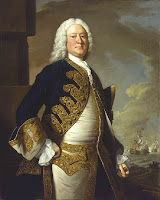 John Byng was born in October 1704 at Southill, Bedfordshire. The fourth son of Rear-Admiral Sir George Byng, he began his naval career at the age of fourteen and quickly rose up through the ranks, becoming a Captain at the age of 23. In 1747, he became commander-in-chief of the Mediterranean fleet having achieved the rank of Vice-Admiral.
John Byng was born in October 1704 at Southill, Bedfordshire. The fourth son of Rear-Admiral Sir George Byng, he began his naval career at the age of fourteen and quickly rose up through the ranks, becoming a Captain at the age of 23. In 1747, he became commander-in-chief of the Mediterranean fleet having achieved the rank of Vice-Admiral.
Having recently been promoted to Admiral, in April 1756 Byng sailed from Spithead with a fleet of ten ships of the line under orders to prevent the French capturing the island of Minorca, a British possession since 1708, be relieving the forces holding Fort St. Philip at Port Mahon. Byng protested that the fleet had been sent out too late without sufficient force to do the job. A month after setting sail, he arrived at Gibraltar where he took command of six more ships, but decided not to take any more troops because he had found out that the French had landed such a large force on the island that an extra detachment would make little difference.
Before departing Gibraltar, Byng wrote to the Admiralty recommending that a larger force be sent to relieve Port Mahon. He arrived at Minorca on 19th May and attempted to contact the defenders of Fort St. Philip, but before he could land his troops a squadron of French ships appeared. The two evenly matched fleets engaged the following day with the British ships having the worst of it due to Byng’s cautiousness and lack of combat command experience resulting in a number of his ships, including his flagship, failing to engage the enemy.
For the next few days, Byng remained in the proximity of the island, but failed to either sight the French fleet or to contact the British garrison. Deciding that there was little more that he could do, he consulted first his officers and then ordered his fleet to sail back to Gibraltar. The defenders held Fort St. Philip until the end of June when they capitulated, earning the right to return home to Britain.
The failure to hold Minorca resulted in public outrage. Fearing that they would be blamed, the naval ministers issued orders for Byng’s arrest. On 26th July he arrived back in Britain and was taken into custody and held in a small room at Greenwich Hospital. In the months before Byng’s trial, the loss of Minorca dominated British politics resulting in the fall of the government in November.
The court martial convened on HMS St. George at Portsmouth on 28th December, with Vice-Admiral Thomas Smith presiding. At the end of the four weeks of proceedings, on 27th January the court exonerated Byng of personal cowardice and disaffection, but found him guilty of not doing his utmost both during the battle and in attempting to relieve the garrison. The court had little alternative but to sentence Byng to death, although they recommended that the Admiralty to request that the King George II show clemency.


